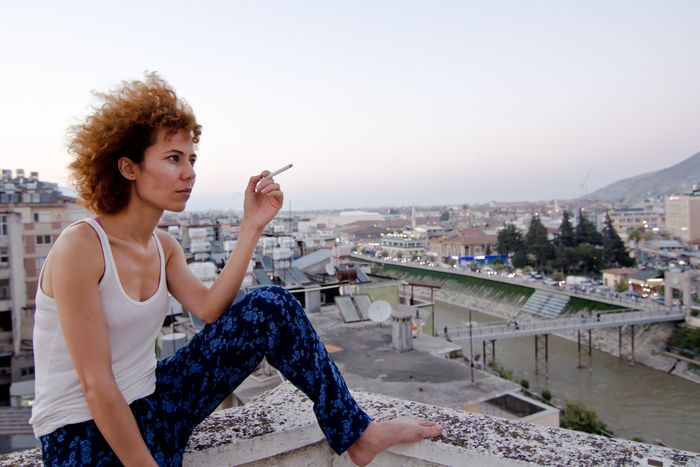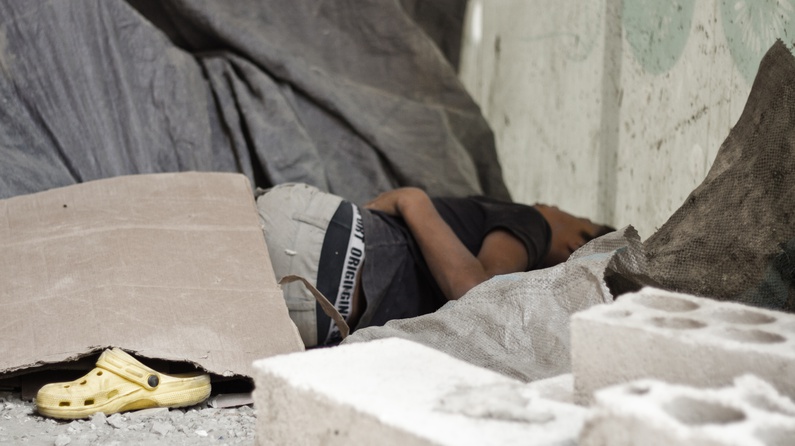
'Young Syrian activists' move beyond fog of War
Published on
What motivates a person to risk indefinite imprisonment, torture, or even death to strive for a vision of a different society? Which experiences make a young person transform from being a committed pacifist into an armed militant? These are the key questions that an upcoming documentary seeks to answer
The Syrian conflict, which has been raging since spring 2011, has evolved from a peaceful, civic movement for freedom of speech and human rights for the Syrian people, into a brutal civil war that has left 120,000 people dead. As Syria begins to be relegated to one of those intrinsically violent and barbaric countries in the eyes of people in the 'developed' world, two young activists seek to remind us of the peaceful beginnings of the Syrian conflict and the humanity and dignity of the Syrian people.
Most people in Europe like to think of themselves as compassionate and feel that they have a strong value for human life, dignity and human rights. When the 'Arab spring' began to unfold in December 2010 we looked on with horror as governments cracked down on protestors, shooting down citizens in cold blood on the streets of Tunis and Cairo. We were horrified when we heard of human rights violations in North Africa and the Middle East as regimes panicked at the newfound aspirations of their citizens. It was easy to empathise with the people in these countries as they demanded employment, freedom of expression and political reform. When they were attacked we were attacked. When we saw their children being shot with plastic bullets and suffocated by CS gas, we could see our own.
Eyes glazed over
When people took to the streets of Dara’a (in south-western Syria) and the capital Damascus in March 2011 we felt the same. Syria is a little further away from our collective consciousness as Europeans, but we could all empathise with the aspirations of freedom of expression, an end to corruption, respect for human rights, and better employment opportunities. When the Syrian military began to ruthlessly crackdown on the protestors in late April 2011 we felt similarly as to how we had felt about Tunis and Cairo. But as the situation descended further and the newly established rebel Free Syrian Army began to strike back against president Bashar al-Assad's regime things seemed to get much more complicated. Who were all these factions? How could people so ruthlessly slaughter each other? Maybe these people weren't so similar to us after all. Damascus, one of the oldest cities in the world and once the centre of human development, has become a synonym for oppression, violence and barbarity.
 Slowly the stories of atrocities, refugee crises and human rights abuses began to slip down the news agenda. Individual atrocities and stories of the use of chemical weapons temporarily stimulate the interest of some, but most Europeans have already switched off to Syria and the plight of its people. By the time of the Boston bombings in April, where most of us rightly expressed our indignation at the casual disregard for human life that resulted in three people being killed and 264 injured, incidents with greater civilian casualties were a daily occurrence in Syria but most of us no longer batted an eyelid. For the international media not all lives seem to be equal, somehow even the victims living in war-torn regions are complicit in the descent into violence.
Slowly the stories of atrocities, refugee crises and human rights abuses began to slip down the news agenda. Individual atrocities and stories of the use of chemical weapons temporarily stimulate the interest of some, but most Europeans have already switched off to Syria and the plight of its people. By the time of the Boston bombings in April, where most of us rightly expressed our indignation at the casual disregard for human life that resulted in three people being killed and 264 injured, incidents with greater civilian casualties were a daily occurrence in Syria but most of us no longer batted an eyelid. For the international media not all lives seem to be equal, somehow even the victims living in war-torn regions are complicit in the descent into violence.
Re-humanising Syria
This growing desensitisation with regards to the Syrian conflict inspired two activists to shed some light on both the peaceful activism for political reform that preceded the conflict, as well as different paths that some young people have taken since the Syrian civil war escalated. Young Syrian Activists is the brainchild of Tomas Spragg, a young Brussels-based humanitarian activists. The project aims to tell the world that Syria is not only about radicalism and violence. The project is more than an ideological exercise, although the core aim of the documentary is not simply to show the humanitarian disaster that the conflict has caused, Tomas feels that the perception of Syria solely as an extremist and dangerous place is linked to why not enough humanitarian aid is reaching its millions of refugees. 'We travelled to the region this summer to document the situation,' he explains. 'We wanted to project the voices of the young activists to the international community, and to put the spotlight firmly on the personal choices these people have been forced to make in the face of crisis. We want to move Syria beyond the fog of war.'
Tomas hopes that the project will show that although many have turned to violence, peaceful activists continue their work. 'Many of the people we spoke to were heavily involved in the peaceful revolution and have since had to make difficult choices in their lives. Some have fled, whilst others have stayed. Some have stuck with peace, others have chosen to fight. All of these people deserve to be heard.'
The Young Syrian Activists documentary will be released before the end of 2013, with premieres in several European countries. The documentary comes at a time when international aid organisations warn that a lack of resources and the pure scale of the conflict have resulted in the citizens of Damascus being on the brink of starvation. Re-humanising Syria in the eyes of Europeans could mean the difference between life and death for many of the people in the country.



